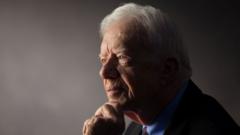Article Text:
Forty-four years have gone by since Jimmy Carter’s presidency ended, yet the United States is strikingly reminiscent of the late 1970s—the era during which he led. Many of today’s issues echo those Carter grappled with: economic hardships, geopolitical tensions, and a crisis of confidence among the American public.
Carter’s presidency was marked by economic instability and international challenges, notably the Iranian hostage crisis that proved detrimental to his electoral success against Ronald Reagan in 1980. Fast forward to 2024, and current President Joe Biden faces similar hurdles, actively dealing with the Taliban's resurgence in Afghanistan and the ongoing conflict in Gaza post-Hamas attacks.
Carter's notable diplomatic achievement, the Camp David Accords, established peace between Egypt and Israel but left the Palestinian issue unresolved—an agonizing predicament that still affects the Middle East today. In a parallel vein, Biden has attempted to manage relationships in the region yet finds nations like Israel pursuing their agendas with little regard for U.S. input.
On the larger geopolitical stage, both presidents have contended with the rising powers of their time. Carter struggled with the Soviet Union, criticizing their aggression in Afghanistan, while Biden faces challenges posed by an assertive China, a legacy of Carter's own policies from 1979 that normalized relations.
Domestically, the inflation plaguing the U.S. now echoes the economic strife of Carter’s years, yet Biden’s administration has managed to sustain job growth, a silver lining that Carter did not experience as he dealt with surging prices in real-time.
Moreover, both presidents have experienced a stark decline in public trust. Carter called it a "crisis of confidence," with approval ratings plummeting during difficult times. Today, Biden also grapples with the realities of public distrust, ignited further during the Trump presidency, as American faith in governance continues to wane.
In a historical lens, contrasts between the two emerge. Carter, a humble leader, achieved notable post-presidency success through humanitarian work and winning the Nobel Peace Prize, while Trump, his modern counterpart, actively pursues political ambitions after his own presidency.
Ultimately, the situations faced by both presidents reveal an ongoing struggle inherent to American leadership—a mix of triumphs and trials that strives to shape the future, even as history offers critical lessons that seem to repeat themselves.
Forty-four years have gone by since Jimmy Carter’s presidency ended, yet the United States is strikingly reminiscent of the late 1970s—the era during which he led. Many of today’s issues echo those Carter grappled with: economic hardships, geopolitical tensions, and a crisis of confidence among the American public.
Carter’s presidency was marked by economic instability and international challenges, notably the Iranian hostage crisis that proved detrimental to his electoral success against Ronald Reagan in 1980. Fast forward to 2024, and current President Joe Biden faces similar hurdles, actively dealing with the Taliban's resurgence in Afghanistan and the ongoing conflict in Gaza post-Hamas attacks.
Carter's notable diplomatic achievement, the Camp David Accords, established peace between Egypt and Israel but left the Palestinian issue unresolved—an agonizing predicament that still affects the Middle East today. In a parallel vein, Biden has attempted to manage relationships in the region yet finds nations like Israel pursuing their agendas with little regard for U.S. input.
On the larger geopolitical stage, both presidents have contended with the rising powers of their time. Carter struggled with the Soviet Union, criticizing their aggression in Afghanistan, while Biden faces challenges posed by an assertive China, a legacy of Carter's own policies from 1979 that normalized relations.
Domestically, the inflation plaguing the U.S. now echoes the economic strife of Carter’s years, yet Biden’s administration has managed to sustain job growth, a silver lining that Carter did not experience as he dealt with surging prices in real-time.
Moreover, both presidents have experienced a stark decline in public trust. Carter called it a "crisis of confidence," with approval ratings plummeting during difficult times. Today, Biden also grapples with the realities of public distrust, ignited further during the Trump presidency, as American faith in governance continues to wane.
In a historical lens, contrasts between the two emerge. Carter, a humble leader, achieved notable post-presidency success through humanitarian work and winning the Nobel Peace Prize, while Trump, his modern counterpart, actively pursues political ambitions after his own presidency.
Ultimately, the situations faced by both presidents reveal an ongoing struggle inherent to American leadership—a mix of triumphs and trials that strives to shape the future, even as history offers critical lessons that seem to repeat themselves.

















